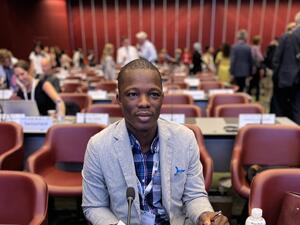Refugee status for Sierra Leoneans to end
Refugee status for Sierra Leoneans to end

Refugees from Sierra Leone at a camp in Liberia during the civil war.
GENEVA, June 6 (UNHCR) - The UN refugee agency said Friday it was recommending that states end refugee status for Sierra Leoneans who fled their country during the decade-long civil war which started in 1991, since the root causes of the refugee problem have ceased to exist.
"There have been fundamental and durable changes since peace was declared in January 2002," UNHCR spokeswoman Jennifer Pagonis told journalists in Geneva. "The cessation will take effect at the end of this year on December 31, 2008 following consultations with the governments of the main countries of asylum and Sierra Leone."
During the height of the conflict as many as 2 million of the country's 6 million citizens were displaced, with some 490,000 fleeing to Liberia and Guinea. Under UNHCR's voluntary repatriation operation from September 2000 to July 2004, more than 179,000 Sierra Leonean refugees returned home and many others returned by their own means.
Around 43,000 refugees from Sierra Leone continue to live in exile, mainly in neighbouring countries, including the Gambia, Guinea, Liberia and Nigeria. Sierra Leonean refugees in sub-Saharan African countries who want to repatriate voluntarily before the end of 2008 can benefit from UNHCR assistance.
Those still in need of international protection will be able to remain in their current host country as refugees while those who do not qualify for asylum after 2008 but do not wish to return home because of strong family, social or economic links with the host country, will be expected to legalize their stay there.
The UN Mission in Sierra Leone completed its withdrawal from the country in January 2006, handing over to the UN Integrated Office in Sierra Leone responsibilities for peace consolidation, development and respect for human rights. Individuals most responsible for atrocities committed during the civil war have been indicted and tried - or are in the process of being tried - by the Special Court for Sierra Leone.
Significant improvements in rule of law and respect for human rights have also been recorded throughout the country and two sets of elections - in 2002 and in 2007 - have been determined free and fair by the international community.








